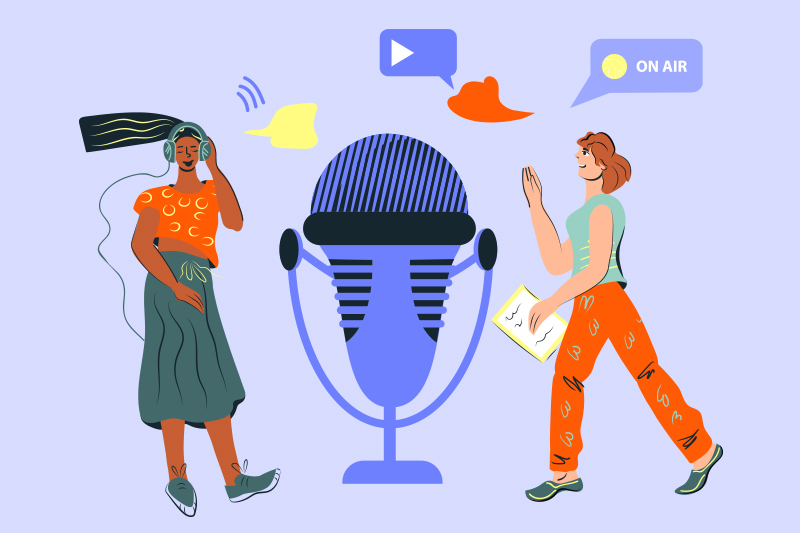News and inspiration for entrepreneurs and creatives, plus updates on new developments at Hatchwise.
Home / Blog Posts / Best Practices For Starting A Podcast
Hatchwise is #1 in Creative Custom Logo Design and Eyecatching Marketing Material Design.

Best Practices For Starting A Podcast
There’s no better time to start a podcast than right now. Podcasting has taken the world by storm because of its ease of access and relatively cheap cost. All you need to start producing great-sounding podcasts is a quality microphone and a distraction-free environment.
However, this isn’t all you need to produce podcasts which people will want to hear over and over again, week after week. It takes time, dedication, and skill to create a great product, as well as the answers to a number of questions every young creator must ask themselves before they began the podcasting process.
Read ahead to learn how to ask the right questions and answer them with clarity and efficiency. Podcasting is a hot market right now and many young entrepreneurs are striking while the iron is hot. Don’t miss out on your chance to gain a following from one of the youngest and hungriest markets on the web today.

The digital revolution has allowed many people to express themselves in new and interesting ways. YouTube channels are popping up everyday with new and exciting channels, and some enterprising individuals are making films with low-cost equipment and their own dreams to drive them on. One of the easiest and most exciting digital communication methods today is podcasting.
Anyone can make a podcast about anything: businesses, individuals, entertainment groups, true crime personas, there is no limit to the podcasts that are being made today. However, if you want people to tune in to your podcasts and enjoy them on a regular basis, there are some fundamental tips and tricks you’ll want to know about and adhere to. Here are a few best practices for those who want to start a new podcast on any topic and in any genre.
- Know the unique, distinct points you have to offer
- Find your audience early and target them when marketing your podcast
- Set a schedule and stick to it, preferably one based on a weekly basis
Know Your Subject
There’s a number of topics podcasts can be made on and a range of people who can make them. Freelancers gravitate toward podcasters, and even businesses, marketers, and entertainment channels are starting to utilize the ease of access and widespread reach of podcasts. You’ll want to know exactly what your topic is and what people want to hear about it.
There many angles you can take when planning out the scope and schedule for your podcast, and although these things will undoubtedly change over the course of your podcast’s life, it’s important to know where you’re going and why at the start of the podcast’s life. Just as in business, knowing what you bring to the table and why people are tuning into your podcast over your competitor’s is a great starting step.
Know Your Audience
Okay, so you know what your topic is, and you can identify the unique and distinct characteristics of your podcast over others on the market…but who’s listening? Many young creators answer “everyone of course!” but this line of thinking is often counterproductive. If you don’t know exactly who you’re targeting and who’s listening your podcast, it’s going to be incredibly difficult to grow your audience and become the success you want to be.
Your core audience will be those who are interested in your topic and have a variety of questions they want answered. Additionally, they may have a thirst for knowledge and tune in because you can offer insights and connect to patterns no one else can. It’s smart to take a page out of great business practices here and create a “buyer persona.”
This means answering a variety of questions about your customers, including their age, annual income, location, and purpose for tuning in. If you can answer these and other questions, you’ll be able to accurately determine who’s watching and tailor any ads or SEO campaigns to those who are more likely to listen and act on them.

Always Have A Purpose
Many people listen to podcasts to learn new information and find answers to questions unavailable throughout the rest of the internet. No matter the exact reason they listen, your audience will appreciate any “value” you can add to their lives. Most often, value is created by a unique or valuable opportunity you can create for your listeners, such as interviews with those in the industry or a personalized and practical guide to accomplishing a goal which your listeners want to achieve.
The creation of value is greatly linked to your target audience, as value is a subjective term and means something different to everyone. Simply put, if you can find an angle which others haven’t thought about, and this greatly interests your listeners, you’re far more likely to garner views and expand your audience quickly and efficiently.
It’s All In The Name
Names are one of the most important yet overlooked part of any podcast. Your name functions in a number of different ways, providing new listeners with a glimpse into the style, tone, atmosphere, and general feel of your podcast. There are a number of different methods you can think about to name your podcast. You can wrack your brain in an effort to think of a clever name and draw in those who are interested to see what your podcast is about.
You can cut to the chase and use a descriptive name, drawing in those people who are looking for a specific topic. You could also use your own name, although this message is mostly done by those with recognizable or “brand” names, by people like Bill Simmons and Joe Rogan. People know these names and associate them with podcasts, but this method can certainly be counterproductive if you’re unknown and looking to make it big.

Create A Schedule
The number one question most young podcasters ask is “how long should my podcast be?” There is no simple answer to this question, however, as there is no set limit to podcast length. Some podcasts are less than ten minutes per episode, while others, like Joe Rogan’s unedited interview-type podcast, is nearly four hours per episode.
At the end of the day, you’ll want to tailor your length to how much content you have; don’t stretch out the time for content which doesn’t demand it, but don’t be afraid to put out a long podcast if you’ve got great, longform content. As far as your release schedule goes, the number one element you’ll have going for you is consistency.
Furthermore, releasing episodes on a more frequent basis is always a good thing, as long as the frequency of your schedule doesn’t interfere with the quality of your episodes. People set their schedules based on days of the week, so if you can release episodes weekly, on the same day every week, people will be more likely to tune in on a consistent basis.
Final Thoughts
Podcasts are all the rage right now and it’s no wonder why. They’re relatively quick and cheap to produce, and it only takes a few simple questions to know how to expand your podcast’s reach and get people watching from week to week. As long as you know your audience, your topic, and your schedule, you can come up with a great podcast that people love to see every week.
- Mosi A.
- October 29, 2020

